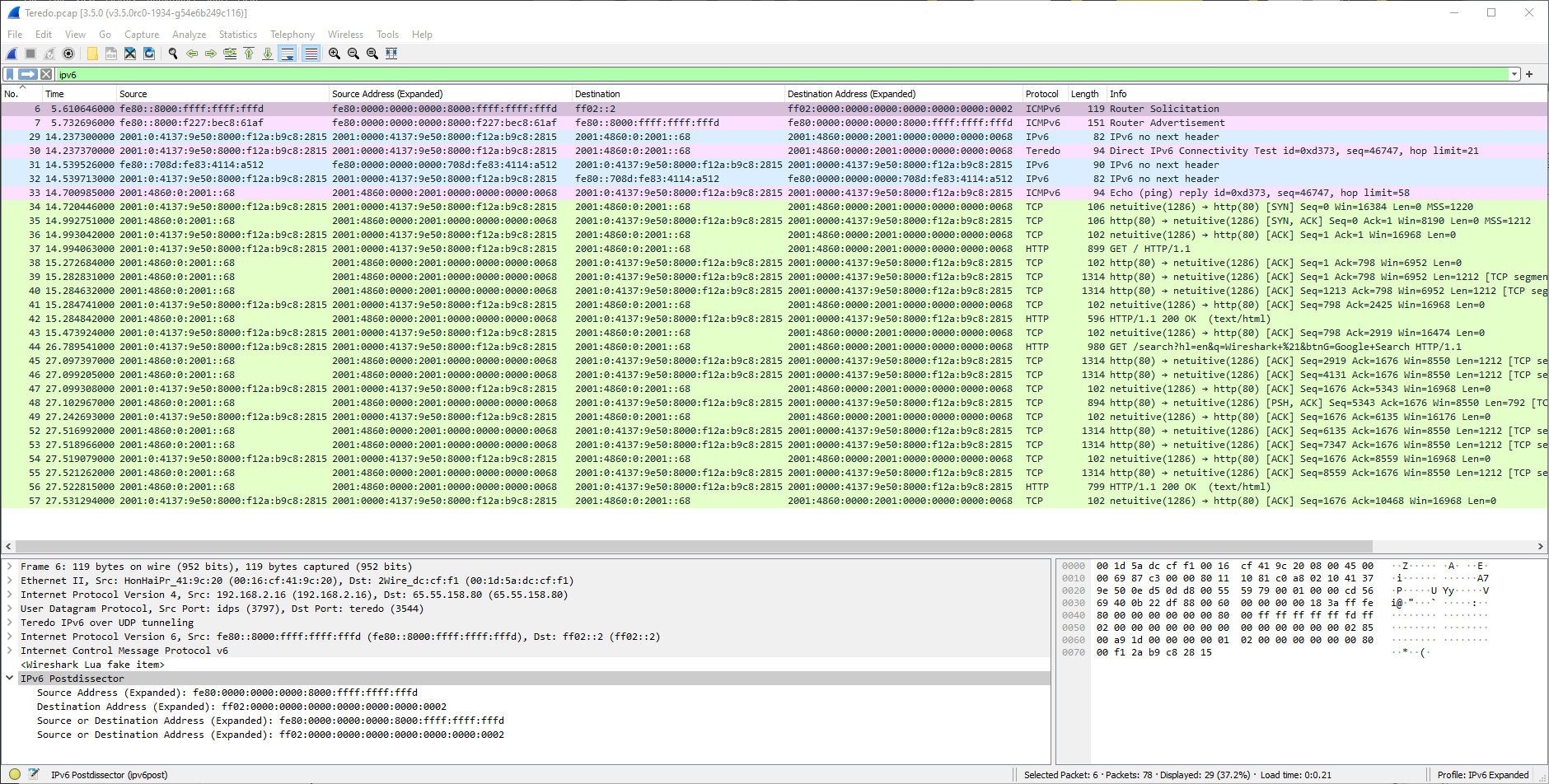An IPv6 post-dissector that fully expands all IPv6 addresses.
This post-dissector was written for someone who requested this feature, although I can no longer remember who that was or when exactly I first provided the post-dissector.
Installation - place in plugins directory - see Lua Support in Wireshark
Example - Using the Teredo.pcap capture file from the IPv6 (and tunneling mechanism) sample capture files with the IPv6 expanded source and destination addresses added as custom columns in an "IPv6 Expanded" profile.
Filter ipv6
Source
--[[
IPv6 postdissector that fully expands all IPv6 addresses.
Copyright (C) 2020 Christopher Maynard
This program is free software; you can redistribute it and/or modify
it under the terms of the GNU General Public License as published by
the Free Software Foundation; either version 2 of the License, or
(at your option) any later version.
This program is distributed in the hope that it will be useful,
but WITHOUT ANY WARRANTY; without even the implied warranty of
MERCHANTABILITY or FITNESS FOR A PARTICULAR PURPOSE. See the
GNU General Public License for more details.
--]]
-------------------------------------------------------------------------
local ipv6_post_info =
{
version = "1.2",
author = "Christopher Maynard",
description = "IPv6 Postdissector that fully expands all IPv6 addresses",
}
set_plugin_info(ipv6_post_info)
local ipv6_post = Proto("IPv6Post", "IPv6 Postdissector")
local pf = {
ipv6_src_expanded = ProtoField.string("ipv6_post.src_expanded", "Source Address (Expanded)"),
ipv6_dst_expanded = ProtoField.string("ipv6_post.dst_expanded", "Destination Address (Expanded)"),
ipv6_addr_expanded = ProtoField.string("ipv6_post.addr_expanded", "Source or Destination Address (Expanded)"),
}
-- Register protocol fields
ipv6_post.fields = pf
local ipv6_src = Field.new("ipv6.src")
local ipv6_dst = Field.new("ipv6.dst")
local ipv6_addr = Field.new("ipv6.addr")
function ipv6_post.dissector(tvbuf, pinfo, tree)
local ipv6_src_ex = {ipv6_src()}
local ipv6_dst_ex = {ipv6_dst()}
local ipv6_addr_ex = {ipv6_addr()}
if ipv6_src_ex ~= nil then
local ipv6_post_tree = tree:add(ipv6_post, "IPv6 Postdissector")
local ipv6_expanded
local i
for i in pairs(ipv6_src_ex) do
ipv6_tvb = ipv6_src_ex[i].range()
ipv6_expanded = string.format("%04x:%04x:%04x:%04x:%04x:%04x:%04x:%04x",
ipv6_tvb(0, 2):uint(), ipv6_tvb(2, 2):uint(),
ipv6_tvb(4, 2):uint(), ipv6_tvb(6, 2):uint(),
ipv6_tvb(8, 2):uint(), ipv6_tvb(10, 2):uint(),
ipv6_tvb(12, 2):uint(), ipv6_tvb(14, 2):uint())
ipv6_post_tree:add(pf.ipv6_src_expanded, ipv6_expanded)
end
for i in pairs(ipv6_dst_ex) do
ipv6_tvb = ipv6_dst_ex[i].range()
ipv6_expanded = string.format("%04x:%04x:%04x:%04x:%04x:%04x:%04x:%04x",
ipv6_tvb(0, 2):uint(), ipv6_tvb(2, 2):uint(),
ipv6_tvb(4, 2):uint(), ipv6_tvb(6, 2):uint(),
ipv6_tvb(8, 2):uint(), ipv6_tvb(10, 2):uint(),
ipv6_tvb(12, 2):uint(), ipv6_tvb(14, 2):uint())
ipv6_post_tree:add(pf.ipv6_dst_expanded, ipv6_expanded)
end
for i in pairs(ipv6_addr_ex) do
ipv6_tvb = ipv6_addr_ex[i].range()
ipv6_expanded = string.format("%04x:%04x:%04x:%04x:%04x:%04x:%04x:%04x",
ipv6_tvb(0, 2):uint(), ipv6_tvb(2, 2):uint(),
ipv6_tvb(4, 2):uint(), ipv6_tvb(6, 2):uint(),
ipv6_tvb(8, 2):uint(), ipv6_tvb(10, 2):uint(),
ipv6_tvb(12, 2):uint(), ipv6_tvb(14, 2):uint())
ipv6_post_tree:add(pf.ipv6_addr_expanded, ipv6_expanded)
end
end
end
register_postdissector(ipv6_post)
